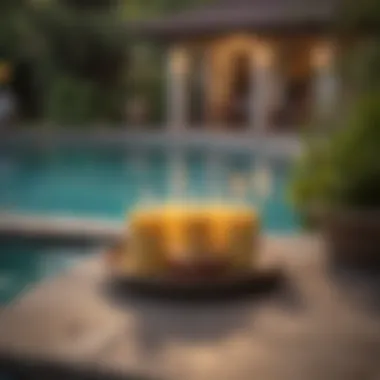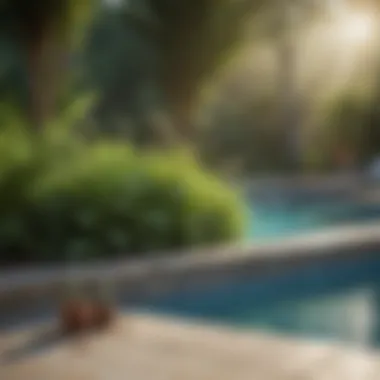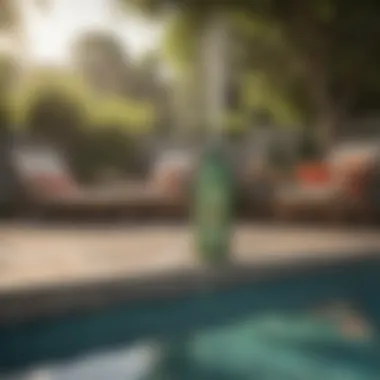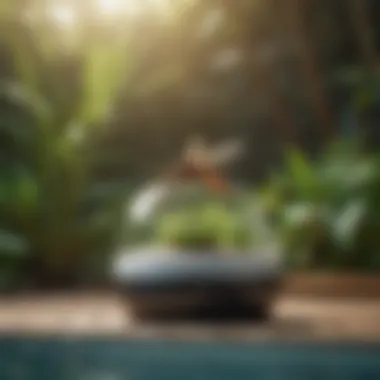Top Mosquito Repellents for Your Pool Area


Intro
Mosquitoes can be a significant nuisance, especially around pool areas. The combination of water, warmth, and vegetation creates an ideal breeding ground for these insects. This article discusses effective mosquito repellent solutions tailored for your outdoor experiences, focusing on poolside environments.
We will explore various types of repellents, understanding their scientific basis and how they perform. Additionally, practical recommendations aim to help homeowners cultivate a mosquito-free space, ensuring comfort and safety for family and friends. Eco-friendly products receive special attention, aligning with mindful consumer choices.
"Effective mosquito control allows for enjoyable poolside moments, promoting relaxation and social gatherings at home."
In the sections that follow, we will discuss potent options for your pool area, recommended application methods, and environmental considerations, providing a well-rounded guide to achieving a pest-free outdoor living environment.
Understanding the Mosquito Problem
Understanding the mosquito problem is crucial for effective outdoor experiences, particularly in spaces like pool areas. Mosquitoes are not just a nuisance; they can pose health risks, carrying diseases such as West Nile virus and Zika virus. In this section, we will explore several aspects related to mosquitoes that will help homeowners take informed actions.
The Biology of Mosquitoes
Mosquitoes belong to the family Culicidae and are small flying insects capable of rapid reproduction. The lifecycle of a mosquito involves four stages: egg, larva, pupa, and adult. Their reproductive rate is high, especially in warm, wet environments. Adult females are the only ones that bite, as they require blood meals to nourish their eggs. Understanding this biological behavior is essential for targeting effective repellent strategies.
Habitat Preferences of Mosquitoes
Mosquitoes thrive in environments with standing water, which is essential for their breeding. This includes ponds, swamps, and even small containers holding rainwater. They tend to prefer shaded areas that provide moisture and protection from direct sunlight. By identifying these habitats around your pool area, steps can be taken to reduce their presence and minimize their attraction to the space.
Why Pool Areas Attract Mosquitoes
Pool areas can attract mosquitoes for several reasons. The combination of water, shaded spots, and sometimes vegetation creates an appealing environment for them. Stagnant water in pool covers or any nearby standing water can serve as breeding grounds. Furthermore, the pool area often has people present, thus providing a regular blood source. Homeowners can use this knowledge to change their surroundings and deter these pests effectively.
Types of Mosquito Repellents
Understanding the various types of mosquito repellents provides essential insight for anyone looking to protect their pool areas from these pests. Each type has unique characteristics that cater to different preferences and needs. When selecting a repellent, factors such as safety, effectiveness, and environmental impact also come into play. Recognizing these elements allows homeowners to make informed decisions, whether they prefer chemical or natural solutions. This section thoroughly explores both categories to guide readers in enhancing their outdoor experience.
Chemical Repellents
Chemical repellents form the backbone of many mosquito control strategies. Their effectiveness, often measured in hours of protection, makes them appealing for use around pool areas where people gather. While efficient, these products come with their own considerations regarding health and environmental impact. Below are prominent chemical repellents.
DEET-based Products
DEET is widely regarded as the gold standard among mosquito repellents. Its key characteristic is its ability to provide long-lasting protection, with formulations ranging from 5% to 100% concentration available in the market. DEET works by interfering with a mosquito's ability to detect human scent. This feature makes it a beneficial choice for outdoor scenarios, especially when activities occur near water. However, it is important to use DEET products as directed to minimize potential skin irritation and environmental damage.
Some users express concern about its strong odor and sticky feel, which could detract from the outdoor experience. That said, its proven efficacy against a wide range of mosquito species makes it popular among many.
Picaridin and Its Efficacy
Picaridin is another strong contender in the realm of chemical repellents. This compound mimics the natural compound found in black pepper plants, offering an entirely different appeal. One of its key characteristics is the lack of an unpleasant scent that often accompanies DEET products. Picaridin effectively repels mosquitoes for up to 14 hours in the right doses, making it a convenient option for prolonged outdoor activities.
Moreover, its safety profile makes it a favorable choice for families. Unlike DEET, user reviews note less irritation when applied to skin. Still, it may not be as effective against all mosquito species, which could be a factor when choosing a repellent.
Oil of Lemon Eucalyptus
Derived from the lemon eucalyptus tree, this oil is notable for both its pleasant scent and effectiveness. The active ingredient, PMD, offers a level of protection similar to DEET, making it a viable contender for those seeking a more natural option. The key characteristic of Oil of Lemon Eucalyptus lies in its botanical origins, which appeals to environmentally conscious consumers.
Using it around pool areas can create a refreshing atmosphere while providing a factor of protection against mosquitoes. However, its efficacy tends to diminish more quickly compared to synthetic products, requiring more frequent reapplication. Aside from the aromatic benefits, some users find its effectiveness slightly varies, which could affect long-term reliance on this repellent.
Natural Alternatives
As awareness grows towards environmental sustainability and health concerns, many individuals seek natural alternatives for mosquito repellents. These products often harness the power of essential oils and traditional herbs, offering a safer option for many. The following sections elaborate on popular natural repellents.
Essential Oils Overview
Essential oils have gained traction for their versatile uses, including mosquito repellent properties. Plant-derived and often carrying pleasant scents, these oils appeal to users looking for alternatives to chemical agents. Their contribution lies in natural compounds that can deter mosquitoes effectively, though their efficacy may vary significantly.
A unique feature of using essential oils involves the wide range of options available. From lavender to peppermint, homeowners can choose blends that not only repel mosquitoes but also enhance the overall sensory experience in their outdoor spaces. However, these natural solutions typically require more frequent reapplication and may not provide the same level of protection as synthetic alternatives.
Citronella and Its Use
Citronella is perhaps the most recognized natural repellent. It is derived from lemongrass and has long been employed for its pest-repelling properties. Its distinct scent is both refreshing and effective in masking human scents that attract mosquitoes, making it a popular choice for pool parties and gatherings.


Many products featuring citronella are available, such as candles and sprays. However, its protection duration tends to be shorter, often lasting only a couple of hours. As such, setting up citronella torches around pool areas can create a festive atmosphere but may require frequent monitoring to ensure effectiveness throughout the evening.
Herbal Remedies
Additionally, various herbal remedies present promising alternatives to chemical repellents. Herbs like rosemary and mint can repel mosquitoes when grown in gardens or used in potpourri. These options provide natural methods for controlling mosquito populations in outdoor areas.
Their unique feature lies in the multi-functional aspect they offer—both as repellents and as aromatic herbs for culinary use. While natural herbs can be effective in smaller areas, relying solely on them for significant mosquito control may not yield optimal results. Therefore, integrating these herbal remedies with other measures may provide better protection for poolside environments.
Factors to Consider When Choosing Repellents
When selecting the right mosquito repellent for your pool area, several factors are critical. These elements do not only affect the immediate comfort but also the long-term effectiveness of your chosen solution. Each factor contributes to ensuring a balanced approach in the fight against these pests. You want a solution that is effective, safe, and environmentally sound.
Safety for Humans and Pets
Safety is paramount when choosing any chemical to repel mosquitoes. Common ingredients like DEET have been effective but have raised concerns about their safety for humans and pets. Always check for recommendations on usage, especially around children. Natural repellents may be a safer option, but understanding the concentration and potential allergic reactions is also necessary.
Deciding on the appropriate product may depend on who is present in your pool area. Some may be more sensitive to strong chemicals. Always follow the instructions on the label and consider testing on a small area before full application. This approach will help confirm if anyone in the vicinity has adverse reactions.
Environmental Impact
The ecological footprint of mosquito repellents should not be overlooked. Many chemical-based products may negatively affect local wildlife and contribute to broader environmental issues. For many, choosing a repellent with minimal ecological impact is essential. Limited awareness exists around how these chemicals seep into water bodies, which can disrupt aquatic life.
Natural repellents often have a lesser environmental toll. Essential oils like citronella may provide adequate protection without harming the ecosystem. Understanding where the active ingredients come from and how they interact with nature can guide more eco-friendly choices.
Duration of Effectiveness
The longevity of a repellent's effectiveness can vary significantly among products. Some are designed for short-term use, while others can offer protection for several hours. Knowing when and how often to reapply can affect your comfort level when enjoying your pool. A product that claims to last all day may not perform as effectively under humid conditions or during physical activity.
To maintain a mosquito-free pool area, consider investing in products with proven duration of effectiveness. Often, higher concentrations of active ingredients may offer longer-lasting protection. However, a balance must be struck between duration and safety, particularly when using synthetic chemicals. When reading labels, pay attention to both duration claims and any mentioned limitations under different conditions.
"Choosing the right mosquito repellent is a balancing act between safety, environmental concern, and effectiveness."
Finding a solution that meets all these criteria can significantly enhance your outdoor experience. Understanding these factors empowers you to make more informed choices.
Application Methods for Pool Area
Understanding the application methods for mosquito repellents in pool areas is crucial for effective mosquito management. These methods not only determine how well the repellents work but also how user-friendly they are. Each method comes with its own set of advantages and considerations that homeowners should familiarize themselves with.
Spray Applications
Spray applications offer a direct way to repel mosquitoes. They are available in various formulations, including aerosols and pump-action bottles. The flexibility of sprays allows users to target specific areas around the pool.
When using sprays, it is essential to apply them in calm weather conditions to prevent drift. This ensures that the product remains where it is most needed. Additionally, wearing protective gear such as gloves and masks can help minimize exposure to chemicals, especially when using potent chemical formulations.
The effectiveness of spray applications can vary based on the active ingredients. Users should check the label for details on duration and reapplication intervals.
Here are some notable points about spray applications:
- Quick Action: Provides immediate protection after application.
- Targeted Use: Focuses on specific areas, ideal for unpredictable mosquito populations.
- Variety of Options: Available in both chemical and natural formulations.
Diffusers and Dispersers
Diffusers and dispersers represent a more passive approach to mosquito control. These devices distribute repellent substances in the air, creating a protective barrier around the pool area. They can be electric or battery-operated, making them convenient for outdoor spaces.
Effective use of diffusers can provide continuous coverage, especially during peak mosquito activity times such as dusk and dawn. However, they require regular maintenance to ensure the effectiveness of the repellent fluid. Homeowners should consider the dimensions of their pool area because larger spaces may require multiple units to achieve optimal results.
Benefits of using diffusers and dispersers include:
- Constant Protection: Ongoing efficacy, reducing the effort needed for frequent applications.
- Ease of Use: Set it and forget it, allowing for a more relaxed outdoor experience.
- Less Human Interaction: Minimizes direct contact with chemicals during application.
Coatings and Barriers
Coatings and barriers create a physical defense against mosquitoes and are often used in conjunction with other methods. They involve applying a protective layer to surfaces and items around the pool area, such as patio furniture and deck areas. This can come in the form of special sprays or treated materials that repel mosquitoes upon contact.
One advantage of using coatings is their ability to last longer than typical sprays, some even offering several weeks of protection with proper maintenance. It is also suitable for homeowners who may dislike the smell of strong repellents, as barrier methods often use milder formulations.


Key considerations for coatings and barriers include:
- Longevity: Longer-lasting effects result in less frequent applications.
- Surface Compatibility: Ensure that the selected product is suitable for the materials being treated.
- Environmental Factors: Weather, such as rain or humidity, may compromise effect.
To maintain effective mosquito control in pool areas, a combination of these application methods is often most beneficial. Assess your environment and preferences to determine what works best.
By adopting these diverse application methods, homeowners can optimize their mosquito repellent strategies, enhancing their comfort and enjoyment of the pool area.
Complementary Strategies to Repellents
Complementary strategies to repellents are essential for creating an effective mosquito management plan, particularly in pool areas. While repellents can deter mosquitoes, combining them with additional methods enhances their overall effectiveness. This is important as current climate conditions are favorable for mosquito survival and proliferation.
Key Elements of Complementary Strategies:
- Mosquito-Repellent Landscaping
- Using Fans and Wind
- Water Management Practices
By assessing these strategies, homeowners can create a holistic approach to mosquito control that addresses multiple facets of the problem.
Mosquito-Repellent Landscaping
Landscaping plays a pivotal role in mosquito management. Certain plants can naturally repel these pests. Options include citronella grass, marigolds, and lavender. Not only do these plants beautify the pool area, but their scents also discourage mosquitoes. Maintaining short grass and removing standing water around planted areas further reduces habitat for mosquitoes.
Considerations for Mosquito-Repellent Landscaping:
- Selection of Plants: Choose plants known for their repellent properties.
- Layout and Arrangement: Position plants to shield poolside areas effectively.
- Regular Maintenance: Keep plants healthy and trimmed to enhance their potency.
Using Fans and Wind
Creating airflow around the pool area can significantly reduce mosquito presence. Mosquitoes are weak flyers, making it difficult for them to navigate in windy conditions. By using oscillating patio fans or strategically placing portable fans, it disrupts their flight and creates an unwelcoming environment.
Benefits of Using Fans:
- Improved Comfort: Provides relief from heat in outdoor settings.
- Increased Effectiveness: Continuous airflow reduces mosquito landing and biting.
Water Management Practices
Managing water is crucial in mosquito control. Mosquitoes breed in standing water. Therefore, eliminating stagnant water around the pool and yard is vital. Regularly emptying containers, cleaning gutters, and ensuring proper drainage helps minimize breeding sites.
Best Practices for Water Management:
- Inspect Regularly: Frequently check for any stagnant water and promptly remove it.
- Use Larvicides: If standing water cannot be avoided, consider using larvicides to prevent mosquito larvae from maturing.
"An effective strategy against mosquitoes combines repellents with other techniques, creating a comprehensive approach to shield outdoor spaces."
By combining these strategies with traditional repellents, homeowners can improve their chances of keeping mosquitoes at bay, ultimately enhancing the enjoyment of their pool areas.
Evaluating Product Effectiveness
In the quest for a mosquito-free pool area, understanding how to evaluate the effectiveness of repellents is crucial. Effective evaluation involves looking at specific elements such as user reviews, scientific studies, and the actual performance of the products. This knowledge helps homeowners choose repellents that will work best for their specific situation, providing comfort and ensuring a more pleasant outdoor experience.
Key benefits of evaluating product effectiveness include:
- Informed Decisions: Homeowners can make educated choices based on real experiences and empirical data.
- Cost Efficiency: Understanding which products work can save money in the long run, preventing the purchase of ineffective options.
- Safety Assurance: Knowledge about repellent effectiveness ensures that chosen products are safe for humans and pets, thus enhancing overall well-being in outdoor settings.
Overall, effective evaluation fosters a proactive approach to mosquito control, aligning product use with actual requirements and conditions in the pool area.
User Reviews and Testimonials
User reviews and testimonials are valuable resources when assessing the effectiveness of mosquito repellents. Real-life experiences provide insights that often cannot be gleaned from marketing materials. Reviews can highlight how well a repellent performs under various conditions, such as humidity, temperature, and the presence of standing water.
Users frequently discuss key aspects, including:
- Application Ease: Is the product simple to apply?
- Duration of Protection: How long does the repellent last before reapplication is necessary?
- Sensory Experience: Does the repellent have a strong smell, or is it pleasant?
By reading a diverse range of testimonials, potential buyers can gain a clearer picture of whether a product will meet their needs. Additionally, aggregated reviews can often reveal consistent patterns about performance, making it easier to differentiate between high-quality and subpar repellents.


Scientific Studies and Evidence
Scientific studies and evidence lend a level of credibility that supports user testimonials. They provide a rigorous examination of how well different mosquito repellents perform in controlled conditions, often revealing aspects such as:
- Active Ingredients: Which ingredients are most effective at deterring mosquitoes?
- Efficacy: How do various products stack up against each other in terms of success rates?
Research indicates that products containing DEET, Picaridin, and Oil of Lemon Eucalyptus often rank highly in effectiveness. Studies have shown that these ingredients can significantly reduce mosquito bites in a variety of environments.
It's important for consumers to look for well-designed research, ideally published in peer-reviewed journals, to ensure that claims are based on solid data. Understanding the context of this research also helps in making more informed purchasing decisions for a mosquito-free outdoor experience.
Best Practices for Application
Effective application of mosquito repellents is crucial in maintaining a comfortable pool area. Understanding best practices can enhance the efficacy of the products used and prolong protection against these pests.
Timing of Application
Timing plays a significant role in the effectiveness of mosquito repellents. Mosquitoes are typically most active during twilight hours, which include dawn and dusk. Applying repellents before these times ensures a protective barrier is established when mosquitoes are likely to swarm. Many experts recommend spraying repellents about 30 minutes before outdoor activity. This allows the product to adhere properly and take full effect.
Additionally, continuous application through the peak mosquito season can prevent infestations. Regular reapplication, depending on the product’s duration of effectiveness, is also important. Many chemical repellents, such as those containing DEET or Picaridin, can last anywhere from a few hours to several. Monitoring the time since last application is essential for optimal defense.
"Proper repellent application timing is key for maintaining a mosquito-free pool area—do not underestimate when you apply!"
Coverage Areas
Thorough and strategic coverage is necessary to ensure that all potential mosquito-dominated zones are protected. Focus on areas that serve as breeding grounds, such as in and around water features. When applying sprays, ensure the mist reaches not only the pool surface but also adjacent seating areas.
Key focus areas for coverage include:
- Patios and Decks: These are often common gathering spots.
- Vegetation: Tall grass, shrubs, and ornamental plants can be resting spots for mosquitoes; ensure to spray near these areas.
- Around Entry Points: Doors and windows of pool houses should not be neglected.
- Eaves and Overhangs: Mosquitoes often take refuge under sheltered areas.
When using diffusers or barriers, an adequate distribution of the product is vital to create a complete shield against mosquitoes. It is crucial to follow manufacturer instructions for optimal coverage and avoid wastage.
Implementing these practices can significantly reduce mosquito presence and enhance your outdoor enjoyment.
Maintenance and Ongoing Strategies
Maintaining an effective mosquito repellent system in your pool area involves more than just initial application. It requires an ongoing commitment to inspecting the environment, reapplying products, and understanding how various factors, particularly weather, play a role in repellent efficacy. This section highlights the significance of these maintenance strategies, offering insights into best practices for continual mosquito control.
Routine Inspection and Reapplication
Routine inspections are critical to ensure that the repellents applied remain effective. Mosquitoes are tenacious pests that can quickly return if conditions become favorable or if existing repellents wear off. Regularly checking the treated areas helps identify any potential breeding spots or changes in conditions that could attract mosquitoes.
During these inspections, look for signs of stagnating water, which can become breeding grounds. If any is found, efforts should be made to remove it or treat it to prevent mosquito larvae from developing. Meanwhile, consider the type of repellent used. For example, chemical sprays might degrade faster under direct sunlight. Therefore, these areas may need more frequent reapplication than shaded regions.
Here are some guidelines for routine inspections:
- Conduct inspections weekly, especially during peak mosquito season.
- Look for areas where water may accumulate.
- Reapply mosquito repellents according to manufacturer's instructions, usually every few hours or on the manufacturer's recommended schedule.
Regularity in these practices creates a more significant defense against mosquito populations.
Impact of Weather on Efficacy
Weather conditions significantly affect the efficacy of mosquito repellents, making it crucial to monitor forecasts and adjust application strategies accordingly. Factors such as humidity, temperature, and rainfall have a direct influence on how long a repellent will remain effective.
For instance, rain can wash away both chemical and natural repellents, prompting the need for immediate reapplication after storm events. Likewise, a spike in humidity can enhance mosquito activity, demanding more frequent interventions. Conversely, extremely dry conditions may reduce mosquito populations temporarily but do not eliminate the need for vigilance.
Here are key weather factors to consider:
- Rain: Reapply after heavy rain to ensure protection.
- Humidity: Watch for increased activity during humid days, leading to more mosquitoes.
- Temperature: Higher temperatures often mean more active mosquitoes, suggesting a need for strategic reapplication of repellents.
In summary, consistent monitoring and timely reapplication based on environmental conditions will optimize the effectiveness of your mosquito repellent efforts, ultimately creating a more pleasant and safe pool area.
Finale
In the pursuit of an enjoyable pool area, the discussion around mosquito repellent is vital. Mosquitoes can turn a serene evening by the pool into a bothersome experience. Understanding effective ways to repel these pests can significantly enhance comfort and security in outdoor spaces.
Summarizing Key Points
- Types of Repellents: Chemical and natural options both exist. DEET-based products are robust but come with safety considerations. Natural alternatives like essential oils can provide a gentler approach.
- Factors in Choosing Repellents: Evaluating safety for humans and pets is essential. There is also the environmental impact, which many consumers are increasingly concerned about. Furthermore, understanding how long a repellent lasts can help in planning successful outdoor activities.
- Application Methods: Different methods such as sprays, diffusers, and barrier treatments can affect effectiveness. Knowing how to apply these correctly ensures that the repellent works as intended.
- Ongoing Strategies: Regular maintenance, including inspection and reapplication, is crucial. Weather can greatly influence how well a repellent performs, making local conditions a key consideration.
Future Considerations in Mosquito Control
As mosquito populations continue to evolve, future considerations will involve more environmentally friendly and effective solutions. Research into biocontrol methods and genetically modified mosquitoes could present new avenues for keeping these pests at bay. Additionally, community efforts in managing stagnant water can reduce breeding grounds, enhancing overall effectiveness of repellents used.







